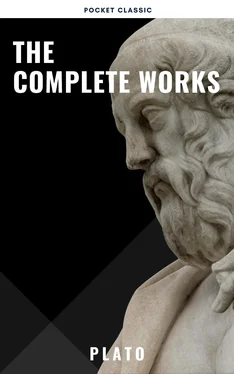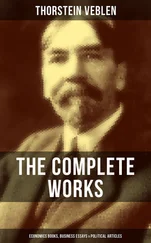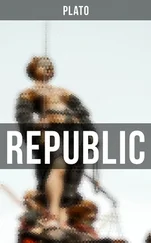SOCRATES: Then do you not think that the Sophists are teachers?
MENO: I cannot tell you, Socrates; like the rest of the world, I am in doubt, and sometimes I think that they are teachers and sometimes not.
SOCRATES: And are you aware that not you only and other politicians have doubts whether virtue can be taught or not, but that Theognis the poet says the very same thing?
MENO: Where does he say so?
SOCRATES: In these elegiac verses (Theog.):
‘Eat and drink and sit with the mighty, and make yourself agreeable to them; for from the good you will learn what is good, but if you mix with the bad you will lose the intelligence which you already have.’
Do you observe that here he seems to imply that virtue can be taught?
MENO: Clearly.
SOCRATES: But in some other verses he shifts about and says (Theog.):
‘If understanding could be created and put into a man, then they’ (who were able to perform this feat) ‘would have obtained great rewards.’
And again:—
‘Never would a bad son have sprung from a good sire, for he would have heard the voice of instruction; but not by teaching will you ever make a bad man into a good one.’
And this, as you may remark, is a contradiction of the other.
MENO: Clearly.
SOCRATES: And is there anything else of which the professors are affirmed not only not to be teachers of others, but to be ignorant themselves, and bad at the knowledge of that which they are professing to teach? or is there anything about which even the acknowledged ‘gentlemen’ are sometimes saying that ‘this thing can be taught,’ and sometimes the opposite? Can you say that they are teachers in any true sense whose ideas are in such confusion?
MENO: I should say, certainly not.
SOCRATES: But if neither the Sophists nor the gentlemen are teachers, clearly there can be no other teachers?
MENO: No.
SOCRATES: And if there are no teachers, neither are there disciples?
MENO: Agreed.
SOCRATES: And we have admitted that a thing cannot be taught of which there are neither teachers nor disciples?
MENO: We have.
SOCRATES: And there are no teachers of virtue to be found anywhere?
MENO: There are not.
SOCRATES: And if there are no teachers, neither are there scholars?
MENO: That, I think, is true.
SOCRATES: Then virtue cannot be taught?
MENO: Not if we are right in our view. But I cannot believe, Socrates, that there are no good men: And if there are, how did they come into existence?
SOCRATES: I am afraid, Meno, that you and I are not good for much, and that Gorgias has been as poor an educator of you as Prodicus has been of me. Certainly we shall have to look to ourselves, and try to find some one who will help in some way or other to improve us. This I say, because I observe that in the previous discussion none of us remarked that right and good action is possible to man under other guidance than that of knowledge (episteme);—and indeed if this be denied, there is no seeing how there can be any good men at all.
MENO: How do you mean, Socrates?
SOCRATES: I mean that good men are necessarily useful or profitable. Were we not right in admitting this? It must be so.
MENO: Yes.
SOCRATES: And in supposing that they will be useful only if they are true guides to us of action—there we were also right?
MENO: Yes.
SOCRATES: But when we said that a man cannot be a good guide unless he have knowledge (phrhonesis), this we were wrong.
MENO: What do you mean by the word ‘right’?
SOCRATES: I will explain. If a man knew the way to Larisa, or anywhere else, and went to the place and led others thither, would he not be a right and good guide?
MENO: Certainly.
SOCRATES: And a person who had a right opinion about the way, but had never been and did not know, might be a good guide also, might he not?
MENO: Certainly.
SOCRATES: And while he has true opinion about that which the other knows, he will be just as good a guide if he thinks the truth, as he who knows the truth?
MENO: Exactly.
SOCRATES: Then true opinion is as good a guide to correct action as knowledge; and that was the point which we omitted in our speculation about the nature of virtue, when we said that knowledge only is the guide of right action; whereas there is also right opinion.
MENO: True.
SOCRATES: Then right opinion is not less useful than knowledge?
MENO: The difference, Socrates, is only that he who has knowledge will always be right; but he who has right opinion will sometimes be right, and sometimes not.
SOCRATES: What do you mean? Can he be wrong who has right opinion, so long as he has right opinion?
MENO: I admit the cogency of your argument, and therefore, Socrates, I wonder that knowledge should be preferred to right opinion—or why they should ever differ.
SOCRATES: And shall I explain this wonder to you?
MENO: Do tell me.
SOCRATES: You would not wonder if you had ever observed the images of Daedalus (Compare Euthyphro); but perhaps you have not got them in your country?
MENO: What have they to do with the question?
SOCRATES: Because they require to be fastened in order to keep them, and if they are not fastened they will play truant and run away.
MENO: Well, what of that?
SOCRATES: I mean to say that they are not very valuable possessions if they are at liberty, for they will walk off like runaway slaves; but when fastened, they are of great value, for they are really beautiful works of art. Now this is an illustration of the nature of true opinions: while they abide with us they are beautiful and fruitful, but they run away out of the human soul, and do not remain long, and therefore they are not of much value until they are fastened by the tie of the cause; and this fastening of them, friend Meno, is recollection, as you and I have agreed to call it. But when they are bound, in the first place, they have the nature of knowledge; and, in the second place, they are abiding. And this is why knowledge is more honourable and excellent than true opinion, because fastened by a chain.
MENO: What you are saying, Socrates, seems to be very like the truth.
SOCRATES: I too speak rather in ignorance; I only conjecture. And yet that knowledge differs from true opinion is no matter of conjecture with me. There are not many things which I profess to know, but this is most certainly one of them.
MENO: Yes, Socrates; and you are quite right in saying so.
SOCRATES: And am I not also right in saying that true opinion leading the way perfects action quite as well as knowledge?
MENO: There again, Socrates, I think you are right.
SOCRATES: Then right opinion is not a whit inferior to knowledge, or less useful in action; nor is the man who has right opinion inferior to him who has knowledge?
MENO: True.
SOCRATES: And surely the good man has been acknowledged by us to be useful?
MENO: Yes.
SOCRATES: Seeing then that men become good and useful to states, not only because they have knowledge, but because they have right opinion, and that neither knowledge nor right opinion is given to man by nature or acquired by him—(do you imagine either of them to be given by nature?
MENO: Not I.)
SOCRATES: Then if they are not given by nature, neither are the good by nature good?
MENO: Certainly not.
SOCRATES: And nature being excluded, then came the question whether virtue is acquired by teaching?
MENO: Yes.
SOCRATES: If virtue was wisdom (or knowledge), then, as we thought, it was taught?
MENO: Yes.
SOCRATES: And if it was taught it was wisdom?
MENO: Certainly.
SOCRATES: And if there were teachers, it might be taught; and if there were no teachers, not?
MENO: True.
Читать дальше












